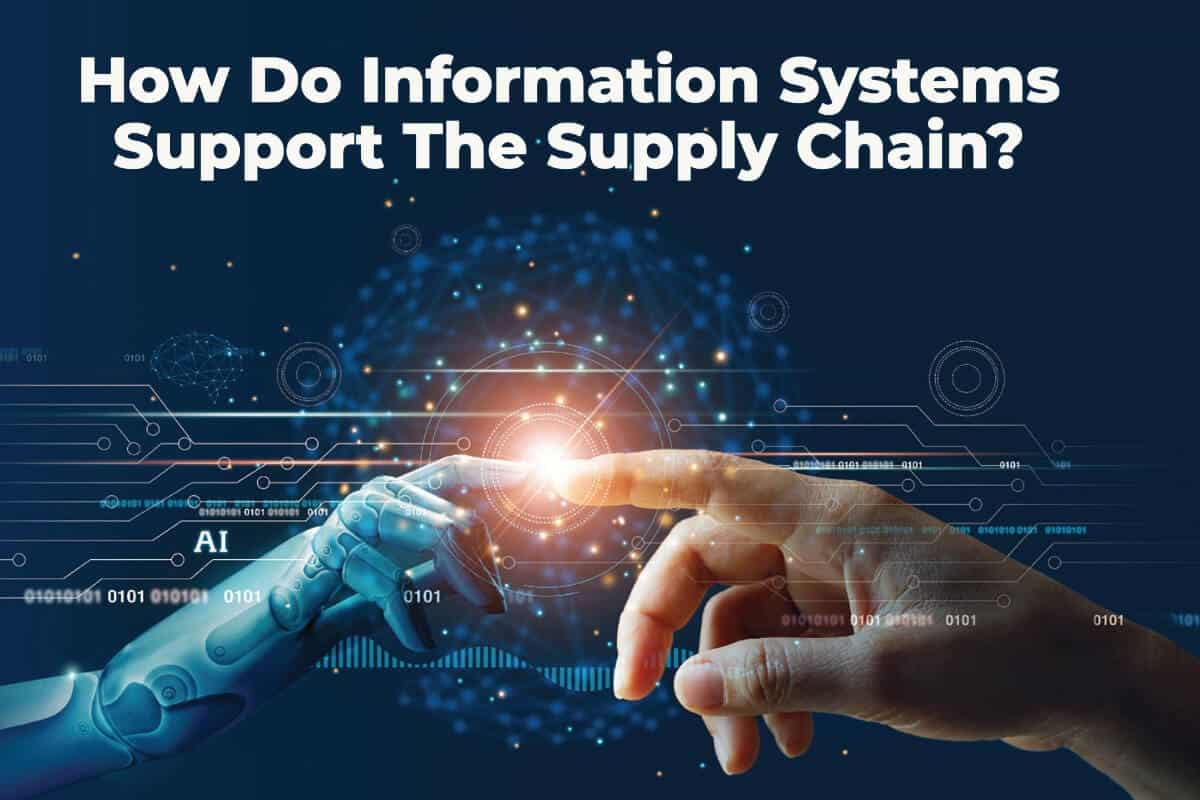Anyone in the supply chain knows and understands that information systems are critical to the supply chain. Information systems provide the basis for the supply chain to make the correct decisions.
Information systems and the information we can obtain are critical in any supply chain. For correct decisions to be made, we must have and use the correct information. The entire supply chain is an organizational beast. The supply chain incorporates many organizations, people, processes, and technology. But the one thing that remains true is that information or the information systems we use continue to be a significant factor in our supply chain.
Table of Contents
- Information Systems Helps Support Supply Chain
- Information Systems Are Critical To Performance
- Information Systems Is The Supply Chain’s Support Glue
- Information Systems, AI, And Support of Supply Chain
- 10 Reasons Why Embracing AI Technology is Crucial for the Global Supply Chain Today
- Resources:
- Related Content
Information Systems Helps Support Supply Chain
One of the main things that an information system can do is help make decisions for the supply chain. The information system can look at all three levels of decision-making from the supply chain, such as strategy, planning, and operations.

It also helps make the correct decisions and supports other supply chain drivers such as facilities, inventory, transportation, sourcing, and pricing. The correct information systems enable us to make the correct decisions through the data we receive from IT and technology.
The information systems data allows us to gather this information, analyze it, and then make a decision to help maximize profitability.
Information Systems Are Critical To Performance
Information systems are critical to a supply chain’s performance because it helps to provide the basis for which supply chain managers can make the correct decisions. It is one of the most critical tools that can help give information and analysis to the entire supply chain.
When the information systems break down in the supply chain, the supply chain itself will break down. That is because information systems are critical to making the best decisions possible.
Information systems also provide the overview that is needed to make those decisions. Information systems help gather information and analyze it as no other tool can.
Information Systems Is The Supply Chain’s Support Glue
Information systems are the glue that helps to hold the supply chain together. The information is critical to the supply chain performance because it is the foundation upon which transactions are executed and decisions are made.
You cannot make a correct decision if you do not know how much the customer wants to purchase, your inventory in stock, or which product should be produced and shipped. In short, the information provides the supply chain with everything needed to make the correct decision.
Information Systems, AI, And Support of Supply Chain
You cannot talk about the information system and the support and supply chain without mentioning the impact of AI on the overall supply chain; AI is known as artificial intelligence.
AI provides the foundation for machined learned planning and the prediction of data. One of the advantages of an AI is that it will take all the data, analyze it, and then learn more about your data needs. AI technology can predict your supply chain’s needs with accuracy and forecast.
AI Is the Way Of The Future In The Supply Chain
Many predict that AI will be the way of the future with the supply chain. So whether we like it or not or agree with AI, it will be the way of the future. Many companies predict that AI will cause a workforce decrease in the supply chain. In other words, AI will replace present-day supply chain workers.

Undoubtedly, AI will remain an essential part of the supply chain. That is why you cannot talk about information systems and their impact on the supply chain without touching upon the importance of AI in the overall supply chain process.
AI And Supply Chain Cost Savings
In 2019 the McKinsey & Company group did a survey where 63% of respondents said they saw an increase in revenue from AI adoption in their companies. As AI continues to become a relevant technology, this increase in revenue is expected to increase.
As the McKinsey & Company Survey said about using AI in manufacturing and the supply chain:
“The two functions in which the largest shares of respondents report cost decreases in individual AI use cases are manufacturing and supply-chain management. In manufacturing, responses suggest some of the most significant savings come from optimizing yield, energy, and throughout. In supply-chain management, respondents are most likely to report savings from spend analytics and logistics-network optimization.”
McKinsey & Company Report
Based on McKinsey & Company’s report, the two areas where companies have consistently seen a decrease in cost and an increase in efficiency are using AI in the manufacturing and supply chain. That is why AI technology is here to stay throughout the entire supply chain and manufacturing process.
AI Will Replace The Workforce
Another concern with many people using AI in the supply chain is that many workers need to be retrained within the present-day supply chain.

AI or Artificial Intelligence technology continues to give significant returns to many companies. Undoubtedly, all companies will eventually be using AI technology within the supply chain – It is the way of the future.
As many parts of the world grapple with decreases in population or a shrinking workforce, many companies are also forced to adopt AI Technology to replace their workers.
As I see it, AI technology is kind of like that train that is coming at you. No matter how hard you want to try to stop the train, you will not be able to stop it. AI technology is the information systems train coming towards the supply chain at a speed we have never seen before.
As AI technology continues to come towards us, it will also help us with our information systems. Companies will make better decisions and choices throughout the supply chain using the correct technology.
If you are interested in seeing how Mondoro can help you with your Supply Chain – we would love to become a valued member of your supply chain.
10 Reasons Why Embracing AI Technology is Crucial for the Global Supply Chain Today
In today’s fast-paced and increasingly complex global market, integrating Artificial Intelligence (AI) into supply chain operations is not just advantageous but essential. Here are ten compelling reasons why embracing AI technology is critical for those involved in the global supply chain:
- Enhanced Forecasting Accuracy: AI algorithms can more accurately analyze vast datasets to predict market trends and consumer demands, enabling better inventory management and resource allocation.
- Improved Efficiency and Productivity: AI automates routine tasks, such as data entry and analysis, freeing human resources for more strategic activities and reducing the likelihood of human error.
- Cost Reduction: By optimizing routes and streamlining operations, AI helps in significantly reduce operational costs. It can identify cost-saving opportunities that humans might overlook.
- Real-time Data Analysis: AI systems can process and analyze data in real-time, providing instant insights into supply chain performance and enabling quicker decision-making.
- Risk Management and Mitigation: AI tools can identify potential risks and supply chain disruptions by analyzing patterns and historical data, allowing for proactive risk management strategies.
- Enhanced Customer Experience: By ensuring timely delivery and maintaining product availability, AI helps in improving the overall customer experience, which is crucial in today’s competitive market.
- Sustainable Operations: AI can optimize routes and inventory levels, leading to reduced waste and lower carbon footprints, thus promoting sustainability in the supply chain.
- Adaptive Supply Chains: AI’s predictive capabilities allow supply chains to be more adaptive to changing circumstances, such as sudden shifts in demand or supply chain disruptions.
- Competitive Advantage: Companies that leverage AI technology can stay ahead of the curve, making more informed decisions and responding more quickly to market changes than their competitors.
- Integration and Collaboration: AI facilitates better collaboration between different components of the supply chain by providing a unified view of data and insights, leading to more cohesive and efficient operations.
Integrating AI into the global supply chain is not a futuristic concept but a present-day necessity. Companies that adopt AI technology are better equipped to handle the complexities of modern supply chains, remain competitive, and meet the ever-evolving demands of the market.
At Mondoro, we create, develop, and manufacture home decor and furnishing products.
Find out more about how Mondoro can help you create, develop, and manufacture excellent home decor and home furniture products – don’t hesitate to contact me, Anita. Check out my email by clicking here or become a part of our community and join our newsletter by clicking here.
Mondoro gives out a FREE Lookbook to anyone interested. You can receive a copy of our latest Lookbook by clicking here.
Listen to our Podcast called Mondoro Company Limited. You can find it on all major podcast platforms. Try out listening to one of our podcasts by clicking here.
Subscribe to our Mondoro Company Limited YouTube Channel with great videos and information by clicking here.
Resources:
To learn more about AI, read the McKinsey & Company Survey, Global AI Survey: AI Proves Its Worth, But Few Scale Impact by reading here.
Related Content
Can A Supply Chain Be Both Efficient And Responsive?
Yes, a supply chain can and should be both efficient and responsive. A supply chain can be efficient by making optimal use of its resources while at the same time remaining responsive to market forces and customer demands.
You can discover more by reading Can A Supply Chain Be Both Efficient And Responsive? by clicking here.
What Is The Difference Between Supply Chain Management and Logistics?
Supply chain management is about collaboration and partnerships to get the goods from raw materials to the end consumer; it is about the partnerships and collaboration within this process. Logistics is one part of supply chain management; logistics involves moving goods from one place to another.
To learn more about loading a dry shipping container, you can read our blog on What Is The Difference Between Supply Chain Management and Logistics? by clicking here.

